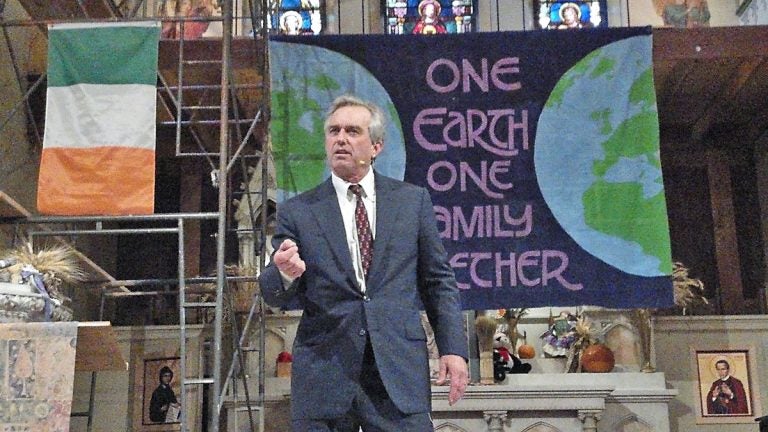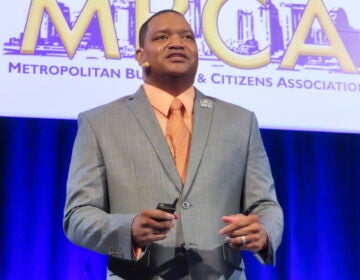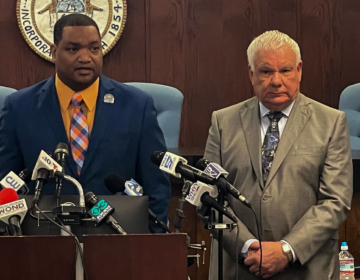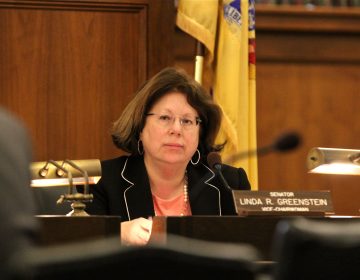Robert F. Kennedy Jr. tells Camden crowd industrial polluters belong in jail

Robert F. Kennedy Jr. spoke on Saturday
The pews were packed in Sacred Heart Church at Broadway and Ferry Avenue in Camden on Saturday. An Irish flag and a banner that read “One Earth / One Family / Together” hung over the marble altar. The crowd – mostly middle-aged members of the church and students from across the region – murmured excitedly while waiting for Robert F. Kennedy, Jr., to appear. A woman checked her watch and noted, “It’s 3 o’clock. Where is he?”
Kennedy emerged about 15 minutes later wearing a pop-star headset. He delivered an hour-long speech from the front of the church about the dangers of coal, the promises of solar and wind energy and what Americans could do to reverse the damage done by big energy companies.
The odor of rotten eggs wafted into the open stained-glass windows – a familiar smell on the Waterfront South neighborhood, which hosts a trash-to-steam plant, sewage treatment plant and other industry. The smell was a pungent example that punctuated Kennedy’s speech against pollution.
Kennedy is a son if the late New York Senator Robert F. Kennedy, who was assassinated in 1968. The talk was hosted by the Center for Environmental Transformation, a Camden-based group that runs community gardens and seeks to educate city residents and others about sustainability.
Kennedy focused on the dangers of America’s continuing dependence on coal. He argued that coal isn’t the cheapest form of energy, as coal advocates say, but is actually the most expensive when you tally up the environmental and health impacts of coal’s waste. Companies like General Electric, Kennedy said, not only degrade the environment but Americans’ way of life.
“Somebody puts pollutant into the waterway so that you can’t eat the fish. That’s an act of theft,” Kennedy said, “They’re stealing from you. They should be in jail as thieves.”
Koch brothers
He went on to lambast Charles and David Koch – often to the chuckles and “uh-huhs” of the crowd – for their role in blocking the laws and funding necessary to wean America from coal and for supporting lax regulation of heavy polluters.
“One of the mantras you’ll hear from the big polluters, like the Koch brothers…is that we have to choose between economic prosperity on the one hand and environmental protection on the other. And that is a false choice. In 100 percent of the situations, good environmental policy is identical to good economic policy.”
Besides eliminating coal and switching to renewables – which Kennedy says is completely possible, citing a number of foreign examples and citing America’s abundant sunshine and wind – Kennedy also advocated for upgrading the nation’s power grid. Doing so, he said, will allow average citizens who produce excess energy from solar panels or wind turbines to sell their energy back into the grid. The current U.S. energy grid has a hard time using the excess energy that comes from solar panels and wind turbines, according to Kennedy.
Allowing everyday people to sell their energy back into the grid, Kennedy said, will wrest power away from big energy companies and give power to citizens.
“If you do that, you can imagine a national energy grid where everybody would turn into an energy entrepreneur. Every American, every home would be a power plant. We’d all be a part of this system, and it’d democratize our energy system,” he said.
Kennedy, Jr., delivered his speech in Camden 46 years after his father made a speech in Camden in April 1968 during his campaign to become the Democratic presidential candidate. Kennedy, Sr., was assassinated two months later in Los Angeles.
Robert Kennedy, Jr., is the chief prosecuting attorney for Riverkeeper, an environmental group that works to clean up the Hudson River in New York, and the chairman of the Waterkeeper Alliance.
WHYY is your source for fact-based, in-depth journalism and information. As a nonprofit organization, we rely on financial support from readers like you. Please give today.




